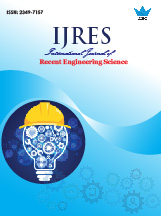Living Skill Development of Children with Down Syndromeat Home based on Parents’ Education Level
 |
International Journal of Recent Engineering Science (IJRES) |  |
| © 2016 by IJRES Journal | ||
| Volume-3 Issue-6 |
||
| Year of Publication : 2016 | ||
| Authors : Tawar, AgusKristiyanto, Gunarhadi |
||
| DOI : 10.14445/23497157/IJRES-V3I6P106 |
How to Cite?
Tawar, AgusKristiyanto, Gunarhadi, "Living Skill Development of Children with Down Syndromeat Home based on Parents’ Education Level," International Journal of Recent Engineering Science, vol. 3, no. 6, pp. 35-38, 2016. Crossref, https://doi.org/10.14445/23497157/IJRES-V3I6P106
Abstract
This research aims to determine the influence of parents’ education level to develop Down syndrome children’s ability of living skill at home. It is a kind of descriptive qualitative research. Data were gathered by using questionnaire, observation, and literature study. Subject used in this research was 32 parents of Down syndrome children of two special schools in Klaten Regency. Results gotten from this research are: Down syndrome children with parents educated in the level of elementary school have level of living skill by 60%; Down syndrome children with parents educated in the level of junior high school have level of living skill by 68%; Down syndrome children with parents educated in the level of senior high school have level of living skill by 78.5%; and Down syndrome children with parents educated in the level of university have level of living skill by 82.5%. On the other side, independence level of Down syndrome children with parents educated in the level of elementary school is 3.4 (fairly); independence level of Down syndrome children with parents educated in the level of junior high school is 3.8 (independent); independence level of Down syndrome children with parents educated in the level of senior high school is 4.5 (highly independent); and independence level of Down syndrome children with parents educated in the level of university is 4.7 (highly independent). From the result, it can be concluded that parent’s education level has influence in the living skilldevelopment of Down syndrome children at home.
Keywords
living skill, parent’s education level, down syndrome
Reference
[1] Davidson,GeraldCdkk.2010.PsikologiAbnormal.TerjamahanNoe rmalasari Fajar.Jakarta:RajawaliPersEdisike–9
[2] Davis, A. (2008). Children with down syndrome: implications for assessment and intervention in the school. School psychology quarterly. Vol. 23 No. 2, p271-281
[3] Durand,VMark,&David,HBarlow.2007.PsikologiAbnormaljilid2 .Jakarta :PustakaPelajar
[4] Geniofam. 2010. Mengasuh &Mensukseskan Anak Berkebutuhan Khusus.Jogjakarta: Garailmu
[5] Irdawati; Muhlisin, Abi.2009. Sindrom Down PadaAnakDitinjau Dari Segi Biomedik DanPenatalaksanaannya, BeritaIlmuKeperawatan, Vol.2No. 1,hal.47-50
[6] Mudyahardjo, Redja.2014.Pengantar Pendidikan, SebuahStudiAwalTentang DasardasarPendidikanPadaUmumnyadanPendidikan di Indonesia. Jakarta.RajaGrafindo Perkasa
[7] OkkiRizki Namira.2012.Komunikasi instruksional guru denganAnakDown Sindrom di SekolahInklusi.eJurnalMahasiswaUnpad Vol. 1 No.1
[8] Ramawati D. Dkk.2012.Kemampuan PerawatanDiriAnakTunagrahita BerdasarkanFaktorEksternaldan Internal Anak.JurnalKeperawatan Indonesia Vol. 15 No. 2 Juli 2012: hal 89-96
[9] Samiwasi.S. Wiryadi.2014. PolaAsuhOrangtuaDalamUpayaPembentukan KemandirianAnak Down Syndrome X Kelas D1/C1 Di SLB Negeri 2 Padang. JurnalIlmiahPendidikanKhusus Vol. 3 No. 3 Hal. 737-746
[10] Scorgie K, dkk. Parent Life Management And Transformational Outcomes When A Child Has Down Syndrome. International Journal Of Special Education. Vol. 16 no. 2 p. 57-67
[11] Sugiyono.2015.Metode PenelitiandanPengembanganResearch and Development.UntukBidangPendidikan, Manajemen, Sosial, Teknik. Bandung Alfabeta
